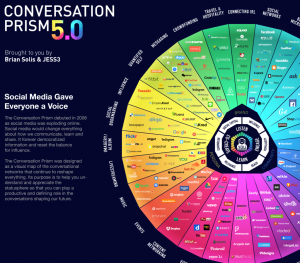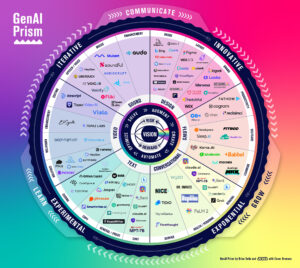Today’s guest Op-ed contributor is Serena Ehrlich, Co-Founder, StartUp Army; Past President, NIRI Los Angeles Chapter, Dallas/Fort Worth Chapter
Recently ESPN established new social media guidelines banning their employees from discussing anything related to ESPN or sports on any social network. Some see this as a clever move for ESPN to save their intellectual property. I see this decision as detrimental both to ESPN as well as their employees. This sweeping decision has two tragic consequences. Not only does it severely hamper its own staff’s room for professional growth, it marginalizes ESPN’s own opportunities to increase its visibility and reach over the web, possibly hampering its own long term growth.
So what is it about ESPN’s policy that has me so conflicted? I am not naive. I know that ESPN’s revenue, like most companies, comes from the knowledge of their staff and on-air talent. The sharing of knowledge by ESPN staffers is a potential loss of revenue. After all, would you turn in to watch a 10 PM program if you could get the same insights pushed to you via Twitter or text? I also know the reputation of ESPN employees may reflect upon brand itself. After all, as Warren Buffet once said “If you lose dollars for the firm by bad decisions, I will be understanding. If you lose reputation for the firm, I will be ruthless.”
Allowing your employees to discuss corporate business details online is a recipe for disaster. There have been plenty of social media blunders, that reiterate the need to manage you company’s online reputation.
I continuously advise clients to create a social media policy for their company. While I believe all companies should have one in place, these policies are especially critical for publicly-held companies who can be investigated and fined by the SEC based on their employee’s public postings. I counsel my clients to be strict with this policy, and to be as detailed as possible to ensure employees don’t misinterpret these rules.
Thus my conflict:
ESPN’s stringent rules restrict their employees from continuing to grow their visibility and reputation online.
And who knows the long-term financial loss this could cause for these employees. As it becomes more common for employers in the media industry to hire staff who bring an audience with them, what happens to the employee’s long term job prospects when they are not allowed to develop these audiences?
And while one may say that this is not a concern for the company, I would also point out that this decision also eliminates ESPN’s talent, the company’s own employees, from becoming online evangelists for ESPN in their personal spheres of influence, effectively cutting off the ability for employees to increase the visibility of ESPN throughout their own social networks and fan base. After all, who supports your company and your brand more than your own staff?
Does it work? Just ask Dell who was able to trace $2M in revenue directly back to Twitter.
There is a fine line in creating an effective policy that is specific enough to keep you within RegFD guidelines and yet broad enough to encourage your own internal fan base to promote your company and brand to their family and friends via social networks. ESPN is an excellent example of one company whose policy went too far and I will continue to watch and see the effect this rule has on their reputation and visibility as well as their talent retention in the next year or two.
—
Serena Ehrlich is one of the founders of StartUp Army, a company dedicated to building and fixing businesses to ensure maximum revenues from the point of inception. She is a 14 year veteran of Business Wire and past president of the National Investor Relations’ Los Angeles and Dallas-Fort Worth chapters. Her love of social media came from working within the newswire industry during the birth and rise of the Internet, industry changes due to legislation such as RedFD and SOX. She can be reached at serena (at) startuparmy (dot) com.






I am also puzzled by what seems to be a lack of confidence by ESPN here in their own personalities. These people are all trained journos, right? Don’t they know the fine art of teasing a story? ESPN seems to think every tweet or post by their employees will spill the beans, rather than view the issue through the prism of effective promotion: drawing its audience in with just enough information to make them want the rest of the story. Just as every news agency does.
Yes! Absolutely!
The truth is that if they want to publish their own personal opinions, they will do it anonymously at any time
http://www.cccostarica.com/hotels/
i love espn. but this is a bad move. not allowed to refert to ESPN at all? that’s really going to hamper their fantasy division that lives off online content, including social media.
I couldn’t agree with you more, Serena. Not sure why ESPN would do this, but they’ve just limited themselves immeasurably. This decision may come back to haunt them when their employees feel the need to speak up for or defend the company, or clear up some misinformation, but can’t. Even if ESPN puts someone in charge of doing that, even one issue can create too much negative buzz for one person or a small team to handle. I predict that guideline will get revised — hopefully, before something negative happens.
Wait, but they let their biggest name use Twitter to talk about sports and link to content on ESPN and other networks all the time?
http://twitter.com/sportsguy33
Yes, ESPN’s policy does allow pre-approved people interact on pre-approved channels. But for those not approved…..
Hey Brian…big fan of yours but i have to say that im not too worried about ESPN. I think they got a lockdown on the sports broadcasting/entertainment industry to say the least. Its not like Fox Sports is going to take over the top spot because they have tight social media guidelines for their staff. I do agree that this is a blow to the staff, but at the end of the day, the will do very little to hurt ESPN in the long run.
Instead of restricting employees, why arent’ they training their employees to be advoctaes of ESPN. There are many ways companies can be harnessing social media to their advantage.
Also a big fan of this blog. But this is the second post that I’ve seen here (the other crying foul on the NFL’s no Tweeting during games rule) about social media / sports connection that suggests the author has very little comprehension of the respective value of the franchise they are speaking about. Let’s make this clear: neither the NFL nor ESPN will see even a slight hiccup in their revenues if they put a muzzle on all of their employees on social networks. Both of those brands have a stranglehold on their markets (via not only the fantastic content that they provide, but via the powerhouse partner infrastructure / ecosystem that they command). Televisions and sports – heard of em? They’re in how many hundred million houses, and their fans are pretty rabid (I’d argue, a lot less fickle than the social media crowd in terms of their loyalty to where they get their content).
BTW: People who are advocating the power of Twitter for marketing need to start parading around better examples than $2- mil from Dell. Dell has kick ass products and is one of the most pervasive tech brands out there. If they passed out black and white flyers about an upcoming sale in major metros, they’d probably net $10- mil in sales. So then would we be seeing pepole saying that flyers are 5x more powerful than social media? When you’re that big / known – you can take out an ad on a.m. radio and get $20 mil in sales. Point being that a mega company will get sales anywhere they focus their attention, when they already have an enormous dedicated following.
I hope you’re right.
Travis, thanks for your input. Yes, my background is the news industry, not Sports. And you can see how quickly that industry revenues have decreased. Yes, sports has the huge added advantage of television reach. But how does ESPN create new products, how does ESPN grow THEIR BRAND to increase THEIR revenues. Right now they are turning to social media and their online platforms. My problem is that their rules around this platform they are engaging upon are not fair or equal to all staff members. Do they care? Probably not.
MANY companies are showing revenue increases online due to social media – not just Dell. The reason we use Dell as the example is that they were one company who reluctantly entered into SM, able to track this amount directly back to their SM platforms and they proved that they were able to generate a brand new revenue stream for their industry. If you want to hear about lesser known successes via Twitter, check out Rancho Bernardo Inn & @7elevensocal etc.
great article, i really appreciate it